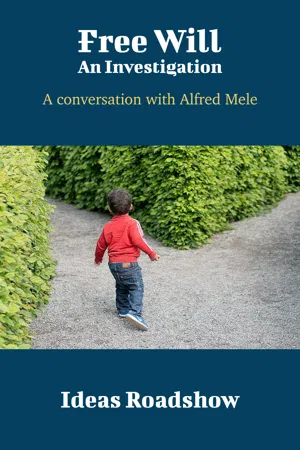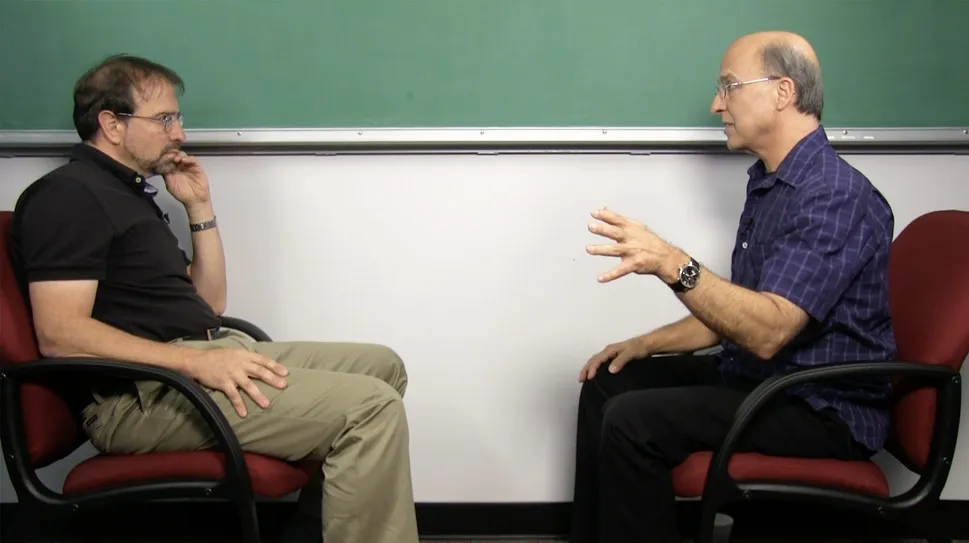![]()
The Conversation
![]()
I. Becoming A Philosopher
From Aristotle to Irrationality
HB: So, philosophy for you: was it something that you were interested in for a long time? Would you describe yourself as a particularly “philosophical” child, say? I’m not so much asking you if your philosophical career was somehow predetermined—we’re going to get there soon enough, I suspect—but more generally assessing your early interests and tracing your trajectory into the field.
AM: As a youngster I didn’t even know what philosophy is. But, yes, I think I always had philosophical interests. I was raised in a religious household—Catholic—and I would just wonder how all these different things could work. I didn’t go to Catholic school until eighth grade, but I went to catechism when I was young and I learned that you’re supposed to love God more than your parents.
I asked my brother, Ron, one day: “Do you love God more than Mom and Dad? It doesn’t make any sense to me, because I don’t know God and I know Mom and Dad. How am I going to love Him more?”
And I remember Ron, who’s a year younger than me, telling me “Yes, I do, because that’s what I’m supposed to do.” But I just found that I couldn’t do it, so that was one of the things I worried about.
HB: Did Ron come into the equation too? Did you start measuring your love for Ron with respect to your love for your parents?
AM: No, I wasn’t clever enough back then. I remember trying to figure out how gravity worked using a globe and toy cars. Why do these cars just stay on the globe? Why don’t they fly off? So, there were things like that. Maybe most kids don’t think about them, I don’t know.
I got interested in philosophy in college. I started off as a math major. I liked math a lot; I still do. Then I took a math course that had a logic component, which I really enjoyed, so I took a logic course which was offered by the Philosophy Department and thought that was really cool.
And once I was in the Philosophy Department I looked around to see what other courses there were and the one that really got me hooked was one on Plato and Aristotle. These guys had views about everything, integrated views, and I thought, My goodness, this is amazing!
At the same time I was also taking some psychology courses, but this was at a time when behaviourism was dominant in much of psychology—certainly where I was—and I just didn’t find it all that exciting.
I was very interested in human behaviour right from the beginning in college, but I wasn’t able to get what I wanted from psychology. But I could, in a way, from Plato and Aristotle.
So after I took this Plato and Aristotle course, I decided to be a philosophy major. Then I went to graduate school in philosophy and wrote my dissertation on Aristotle and Aristotle’s theory of human motivation. Back then I could read ancient Greek pretty well.
HB: How did you pick that up? You must have had to do quite a bit of extra work there.
AM: In graduate school. I went to a Catholic high school, so I learned Latin then; and then in college I learned Spanish. But neither of them would qualify for the language requirement in graduate school at the University of Michigan.
HB: Spanish wouldn’t qualify?
AM: No. I think because I was in philosophy. If I’d been in a different discipline, maybe it would have been okay, some different discipline.
HB: You needed what? French?
AM: Yes: French or German. So I took French. Then I started studying classical Greek, which is the hardest of those.
HB: So I’ve been led to understand.
AM: Originally, for perhaps my first three or four years out of graduate school, I thought I would just be an Aristotle scholar. Of course, there are people who do that: they just write on Aristotle and interpret his ideas. But I was always really interested in some of these issues he was talking about, and I started having views of my own about these things.
After a while I thought, Well, now it’s time to branch out and tackle those issues directly.
HB: Such as?
AM: Well, my first book is called Irrationality, and it’s on what’s called weakness of will, self-deception and self-control. Aristotle had a view on weakness of will, so did Plato, and they both had views on self-control. Self-deception they didn’t have much to say about: Aristotle had nothing that I can think of, while Plato only had one sentence.
HB: What was the sentence?
AM: “The lie in the soul is the worst thing of all.” That’s about it. “The lie in the soul” is lying to yourself.
HB: Right. He doesn’t really explain how it can happen, though. It’s just bad.
AM: That’s right. And I wanted to know how it could happen. Weakness of will is a matter of being convinced that it’s best to do one thing, but then not doing it and doing something else instead when you could have done the thing that you believed to be best.
For example, you believe it’s best not to have a third bottle of beer because you’re about to drive home, but you have one. Or, you believe it’s best not to eat a second dessert, but you eat one anyway. Plato actually thought, “This can’t happen unless the guy doesn’t really know what’s best.”
HB: You can’t knowingly desire something which is not in your best interest, right? Isn’t that a Platonic idea?
AM: That’s right. Which means that if you do go ahead and do that then you must either have been compelled to do it or you didn’t really know. Aristotle had a more relaxed attitude, but generally speaking he seemed to think that there had to be some defect in your knowledge in order to do this.
And I just thought, Well, this sort of thing happens all the time. It happens to me. People tell me it happens to them. How does it actually work?
And to figure that out, I didn’t want to do it just purely hypothetically or purely intellectually. I wanted to look at data. So I did: I looked at lots of data. From quite early on in my career I was really interested in how we could apply scientific findings to these age-old philosophical questions.
HB: Where did these data come from for this particular project?
AM: I got a lot of use out of Walter Mischel’s data on self-control in children. He wanted to know under what conditions four-year-old kids could delay the longest and wait for their preferred reward over a less-preferred one.
Under one set of conditions, you get kids to say whether they like marshmallows better than pretzels, or pretzels better than marshmallows. Then you leave them both out, and you tell the kids who prefer marshmallows, “You can have the pretzels whenever you want, but in order to get the marshmallows you have to wait for the experimenter to return. So you can signal for the experimenter to come back and get the pretzels, or you can wait.”
When both rewards are present, the kids ...

